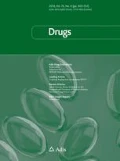Abstract
Introduction
Currently available anticoagulants have limitations for long term treatment of venous thromboembolism (VTE).
Objective
A meta-analysis was performed to evaluate the efficacy and safety of new oral anticoagulants (NOACs) for extended treatment of VTE.
Methods
PubMed, Cochrane Library, EMBASE, Web of Science and CINAHL databases were searched from January 01, 2001 through February 28, 2013. Randomized controlled trials (RCTs) comparing NOACs (apixaban, rivaroxaban and dabigatran) with placebo or warfarin for extended treatment of VTE were selected. Primary efficacy outcome was recurrent VTE or VTE related death, and primary safety outcome was major bleeding. We used random-effects models.
Results
Four RCTs included 7,877 participants. NOACs significantly lowered the risk of recurrent VTE or VTE-related death compared to placebo/warfarin (odds ratio [OR] 0.25, 95 % confidence interval [CI] 0.07 to 0.86; number needed to treat [NNT] = 30). All-cause mortality was significantly lower in NOACs group compared to placebo (OR 0.38, 95 % CI 0.18 to 0.80). Risk of major bleeding was not different with NOACs compared to placebo/warfarin (OR 0.88, 95 % CI 0.27 to 2.91). However, NOACs caused significantly higher rate of major or clinically relevant bleeding compared to placebo (OR 2.69, 95 % CI 1.25 to 5.77; number needed to harm [NNH] = 39). All three NOACs (apixaban, rivaroxaban and dabigatran) individually significantly reduced recurrent VTE or VTE-related death compared to placebo. Major or clinically relevant bleeding was higher with dabigatran and rivaroxaban but not with apixaban.
Conclusion
NOACs are effective for the extended treatment of venous thromboembolism and may reduce the risk of all-cause mortality. Dabigatran and rivaroxaban may cause more major or clinically relevant bleeding.






Similar content being viewed by others
References
Schafer AI. Venous thrombosis as a chronic disease. N Engl J Med. 1999;340:955–6.
Prandoni P, Lensing AW, Cogo A, et al. The long-term clinical course of acute deep venous thrombosis. Ann Intern Med. 1996;125:1–7.
Prandoni P, Noventa F, Ghirarduzzi A, et al. The risk of recurrent venous thromboembolism after discontinuing anticoagulation in patients with acute proximal deep vein thrombosis or pulmonary embolism: a prospective cohort study in 1,626 patients. Haematologica. 2007;92:199–205.
Agnelli G, Becattini C. Treatment of DVT: how long is enough and how do you predict recurrence. J Thromb Thrombolysis. 2008;25:37–44.
Osinbowale O, Ali L, Chi YW. Venous thromboembolism: a clinical review. Postgrad Med. 2010;122:54–65.
Connors JM. Extended treatment of venous thromboembolism. N Engl J Med. 2013;368:767–9.
Ridker PM, Goldhaber SZ, Danielson E, et al. Long-term, low-intensity warfarin therapy for the prevention of recurrent venous thromboembolism. N Engl J Med. 2003;348:1425–34.
Kearon C, Ginsberg JS, Kovacs MJ, et al. Comparison of low-intensity warfarin therapy with conventional-intensity warfarin therapy for long-term prevention of recurrent venous thromboembolism. N Engl J Med. 2003;349:631–9.
Agnelli G, Buller HR, Cohen A, AMPLIFY-EXT Investigators, et al. Apixaban for extended treatment of venous thromboembolism. N Engl J Med. 2013; 368:699–708.
EINSTEIN Investigators, Bauersachs R, Berkowitz SD, Brenner B, et al. Oral rivaroxaban for symptomatic venous thromboembolism. N Engl J Med. 2010; 363:2499–510.
Schulman S, Kearon C, Kakkar AK, RE-MEDY Trial Investigators; RE-SONATE Trial Investigators, et al. Extended use of dabigatran, warfarin, or placebo in venous thromboembolism. N Engl J Med. 2013;368:709–18.
Liberati A, Altman DG, Tetzlaff J, et al. The PRISMA statement for reporting systematic reviews and meta-analyses of studies that evaluate health care interventions: explanation and elaboration. Ann Intern Med. 2009;18(151):W65–94.
Higgins JPT, Altman DG, Sterne JAC. Assessing risk of bias in included studies. In: Higgins JPT, Green S, editors. Cochrane handbook for systematic reviews of interventions, Version 5.1.0 (updated March 2011). Available at: http://www.cochrane-handbook.org.
Fox BD, Kahn SR, Langleben D, et al. Efficacy and safety of novel oral anticoagulants for treatment of acute venous thromboembolism: direct and adjusted indirect meta-analysis of randomised controlled trials. BMJ. 2012;345:e7498.
Becattini C, Agnelli G, Schenone A, WARFASA Investigators, et al. Aspirin for preventing the recurrence of venous thromboembolism. N Engl J Med. 2012;366:1959–67.
Kearon C, Gent M, Hirsh J, et al. A comparison of three months of anticoagulation with extended anticoagulation for a first episode of idiopathic venous thromboembolism. N Engl J Med. 1999;340:901–7.
Kearon C, Kahn SR, Agnelli G, et al. Antithrombotic therapy for venous thromboembolic disease: American College of Chest Physicians Evidence-Based Clinical Practice Guidelines (8th Edition). Chest. 2008;133:Suppl:454S–545S (Erratum, Chest 2008;134:892).
Larsen TB, Rasmussen LH, Skjøth F, et al. Efficacy and safety of dabigatran etexilate and warfarin in ‘real world’ patients with atrial fibrillation: a prospective nationwide cohort study. J Am Coll Cardiol. 2013. doi:10.1016/j.jacc.2013.03.020.
Sharma A, Chatterjee S, Lichstein E, et al. Extended thromboprophylaxis for medically ill patients with decreased mobility: does it improve outcomes? J Thromb Haemost. 2012;10:2053–60.
Funding
No external funding was used in the preparation of this manuscript.
Conflict of interest
Partha Sardar, Saurav Chatterjee and Debabrata Mukherjee have no conflicts of interest that might be relevant to the contents of this manuscript.
Authorship
Partha Sardar had full access to all of the data in the study and take responsibility for the integrity of the data and the accuracy of the data analysis. All authors had access to the data and a role in study design, interpretation and writing of the manuscript.
Disclosure
None.
Author information
Authors and Affiliations
Corresponding author
Rights and permissions
About this article
Cite this article
Sardar, P., Chatterjee, S. & Mukherjee, D. Efficacy and Safety of New Oral Anticoagulants for Extended Treatment of Venous Thromboembolism: Systematic Review and Meta-Analyses of Randomized Controlled Trials. Drugs 73, 1171–1182 (2013). https://doi.org/10.1007/s40265-013-0082-7
Published:
Issue Date:
DOI: https://doi.org/10.1007/s40265-013-0082-7




